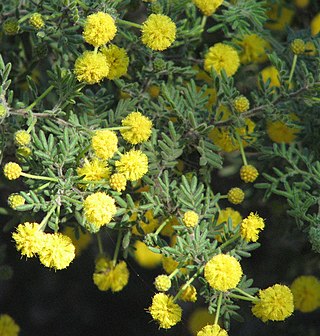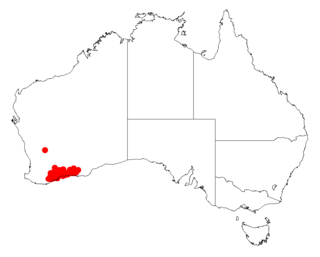
Acacia acanthoclada, commonly known as harrow wattle, is a species of flowering plant in the family Fabaceae and is endemic to southern continental Australia. It is a low, highly branched, spreading and spiny shrub with wedge-shaped to triangular or egg-shaped phyllodes with the narrower end towards the base, and spherical heads of up to 30 flowers, and linear, spirally-coiled pods.

Acacia colei is a perennial bush or tree native to northern Australia. A common name for it is Cole's wattle. Acacia colei blooms from May through September and the flowers are bright yellow.

Acacia alata, commonly known as winged wattle, is a species of flowering plant in the family Fabaceae and is endemic to the south-west of Western Australia. It is a much-branched shrub, its phyllodes continuous with the branches and arranged on either side of them, flowers arranged in racemes of 2 spherical heads of white to golden-yellow flowers, and flat, curved, crusty pods 20–80 mm (0.79–3.15 in) long.

Acacia plicata is a species of wattle which is endemic to an area between Perth and Geraldton in Western Australia.

Acacia aemula is a species of flowering plant in the family Fabaceae and is endemic to the south coast of Western Australia. It is an openly-branched, often prostrate, rush-like subshrub with cylindrical to more or less flat and linear phyllodes similar to its branchlets, spherical heads of cream-coloured or golden-yellow flowers and reddish-brown, thin, paper-like or crusty pods.

Acacia ampliata is a species of flowering plant in the family Fabaceae and is endemic to a restricted area in the south-west of Western Australia. It is a shrub or small tree with hairy branchlets, linear phyllodes, golden-coloured flowers arranged in oblong to short-cylindrical heads, and linear pods up to 110 mm (4.3 in) long.

Acacia yorkrakinensis, also known as soft-leaf wodjil, is a shrub belonging to the genus Acacia and the subgenus Juliflorae that is native to Western Australia.

Acacia sphenophylla is a shrub of the genus Acacia and the subgenus Phyllodineae that is endemic to a small area in western Australia.

Acacia ancistrophylla is a species of flowering plant in the family Fabaceae and is endemic to southern Australia. It is a dense, rounded shrub, with lance-shaped phyllodes with the narrower end towards the base, spherical heads of yellow flowers, and linear pods up to 40 mm (1.6 in) long.

Acacia anserina, also known as hairy sandstone wattle, is a species of flowering plant in the family Fabaceae and is endemic to a small area in the Kimberley region of Western Australia. It is an erect, openly-branched shrub with its branchlets densely covered with soft hairs, widely elliptic to widely egg-shaped phyllodes with the narrower end towards the base, spherical heads of 17 to 25 light golden flowers, and narrowly oblong pods up to 4–5 mm (0.16–0.20 in) wide.

Acacia deltoidea is a shrub of the genus Acacia and the subgenus Plurinerves that is endemic to north western Australia.

Acacia patagiata, also commonly knowns as salt gully wattle, is a shrub of the genus Acacia and the subgenus Plurinerves that is endemic to south western Australia.

Acacia sciophanes, commonly known as the Ghost wattle or Wundowlin wattle, is a shrub of the genus Acacia and the subgenus Plurinerves that is endemic to a small area in south western Australia. In 1995 it was declared as rare in 1995 according to the Western Australian Wildlife Conservation Act 1950 and is listed as endangered under the Environment Protection and Biodiversity Conservation Act 1999.

Acacia anarthros is a species of flowering plant in the family Fabaceae and is endemic to the south-west of Western Australia. It is a shrub with bipinnate leaves with 1 leaflet, each with 2 or 3 pairs of pinnules, spherical heads of 14 to 17 flowers, and narrowly oblong pods up to about 60 mm (2.4 in) long.

Acacia guinetii, commonly known as Guinet's wattle, is a shrub of the genus Acacia and the subgenus Pulchellae that is endemic to a small area along the coast of western Australia

Acacia pentadenia, commonly known as karri wattle, is a shrub or tree of the genus Acacia and the subgenus Pulchellae.

Acacia preissiana is a shrub of the genus Acacia and the subgenus Pulchellae that is endemic to an area of south western Australia.

Acacia macdonnelliensis, commonly known as the MacDonnell mulga or the Hill mulga, is a species of Acacia native to central Australia. The Indigenous Australians the Alyawarr peoples know the plant as irrar, the Kaytetye know it as arleth-arlethe or arwele arleth-arlethe and the Western Arrernte peoples know it as irrkwarteke.
Acacia adjutrices, commonly known as convivial wattle, is a species of flowering plant in the family Fabaceae and is endemic to a few places in the south-west of Western Australia. It is a small, multi-stemmed shrub with thin stems, mostly linear, ascending to erect phyllodes, flowers arranged in up to 4 spherical heads of golden yellow flowers, and crust-like, linear to narrowly oblong pods.



















